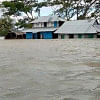Pratapnagar union cursed by cyclones, erosion

Every cyclone that hits Bangladesh puts the lives and livelihoods of countless individuals on the line, but Pratapnagar union in Satkhira's Assasuni upazila is especially accursed in this regard. According to a report in this daily, hundreds of Pratapnagar people are now homeless due to the devastation caused by successive cyclones, the latest being Midhili, and the concurrent erosion. Amid such a situation, it is extremely concerning that those affected have reportedly received little to no relief or support.
As Pratapnagar is surrounded by two rivers, the effects of climate change, especially erosion, are always present. And when a cyclone hits the union, the sufferings drastically multiply. According to a local, cyclones Sidr and Aila destroyed everything in the late 2000s, and then came Amphan, which tore down the embankments and eroded lands in 2020. Since Amphan, a few hundred families have left the union after their homes, including the 21 Ashrayan houses for landless people, were washed away. Two weeks ago, Cyclone Midhili ripped apart all the makeshift shelters, forcing the locals to look for new homes yet again. This begs the question: are these people destined to bear this endless misery?
Nearly five million of Bangladesh's population live in active floodplains of major rivers, which are at risk of erosion. The rivers of this country devour thousands of hectares of land every year, leaving people—like those in Pratapnagar—homeless and landless. Furthermore, Bangladesh has been placed 17th among the countries with the largest number of internally displaced people. Many of these displacements are due to natural disasters, such as floods, river erosion and cyclones—as is evident in Pratapnagar's case. About 16-26 million people may be forced out of their homes by 2050 due to climatic hazards, according to a study. Despite this widespread crisis, there is apparently very little attention and support for these people, and Pratapnagar residents are no exception.
It is unacceptable that hundreds of people in a union are suffering to such an extent. According to Dr Ainun Nishat, climate change specialist and professor emeritus at Brac University, the locals have not been provided with any compensation or relief. The authorities cannot sit idle; it must ensure rehabilitation and livelihood. Furthermore, alongside basic mitigation efforts like building embankments, the government needs a proper post-disaster rehabilitation programme, as pointed out by the expert. It must also hand over the management of embankments to the locals, as this would avoid bureaucratic red tape and ensure swift action. If these measures are taken, we hope Pratapnagar will finally be free of this curse.
Follow The Daily Star Opinion on Facebook for the latest opinions, commentaries and analyses by experts and professionals. To contribute your article or letter to The Daily Star Opinion, see our guidelines for submission.

 For all latest news, follow The Daily Star's Google News channel.
For all latest news, follow The Daily Star's Google News channel. 







Comments